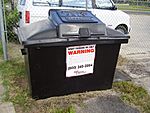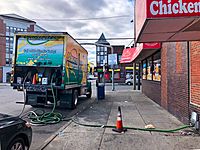Yellow grease facts for kids
Yellow grease is a common name for used cooking oil. You might also hear it called used cooking oil (UCO), used vegetable oil (UVO), or waste vegetable oil (WVO). It's the oil left over after businesses like restaurants use it for cooking.
This used oil is very valuable! It can be turned into many different products. For example, it's used to feed farm animals. It also helps make things like soap, makeup, clothes, rubber, and cleaning products. A lot of yellow grease is also used to create special fuels called biodiesel.
Yellow grease is different from "brown grease." Yellow grease usually comes from deep fryers. Brown grease, on the other hand, comes from special traps that catch grease in drains.
Contents
What is Yellow Grease Used For?
Yellow grease is a super useful resource that gets a second life! Instead of being thrown away, it's collected and recycled.
Making New Products
- Animal Feed: It can be added to food for livestock, like cows and pigs.
- Everyday Items: It helps create many things we use daily, such as soap, makeup, and detergents. It's even used in some clothes and rubber products.
Fueling Our World
- Biodiesel: A big use for yellow grease is making biodiesel. This is a type of fuel that can power vehicles, just like regular diesel. Using biodiesel helps reduce our reliance on fossil fuels.
- Renewable Diesel: Another fuel made from yellow grease is renewable diesel. It's very similar to regular diesel but comes from recycled materials.
Because so many industries want yellow grease, there's a lot of demand for it. Experts say that less than a third of all yellow grease collected each year can be used for making biodiesel.
Collecting Used Cooking Oil
Collecting used cooking oil is a big business! Special companies have trucks that visit restaurants and other places to pick up their used oil.
How Collectors Work
These companies often have large fleets of trucks. They cover wide areas, sometimes even across a whole country. They take the used oil to big processing plants.
Many collectors now use modern technology. This includes special software to plan the best routes for their trucks. They also use systems to track how full the oil bins are. This helps them collect the oil efficiently.
Rules for Collection
In places like the UK, collecting waste cooking oil has rules. Companies must be registered to carry waste. For every collection, a special document called a "waste transfer note" is filled out. This note helps track where the oil comes from and where it goes.
Turning Used Oil into New Products
The process of recycling waste cooking oil is called "rendering." It's how the used oil is cleaned and prepared for its new life.
The Rendering Process
1. Separation: During rendering, the used cooking oil is heated and processed. This separates the useful oil (called fatty acid) from any water, solid bits, or dirt. 2. Refined Oil: What's left after this cleaning process is called "refined used cooking oil." This clean oil is the main ingredient for making biodiesel and renewable diesel. 3. Making Fuel: The refined oil then goes through more steps to become fuel. It can be turned into biodiesel through a process called transesterification. Or, it can become renewable diesel through hydrodeoxygenation.
Some companies that collect the oil also have their own rendering plants. Others sell the collected grease to bigger companies that specialize in rendering.
 | Delilah Pierce |
 | Gordon Parks |
 | Augusta Savage |
 | Charles Ethan Porter |



